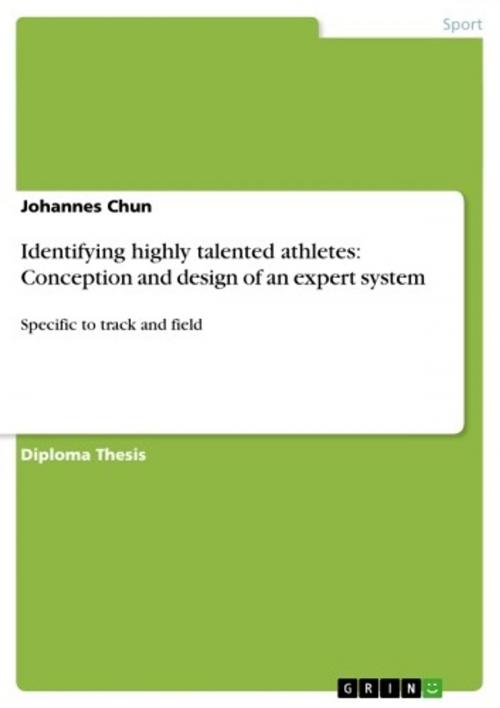Identifying highly talented athletes: Conception and design of an expert system
Specific to track and field
Nonfiction, Sports, Individual Sports, Training| Author: | Johannes Chun | ISBN: | 9783638678636 |
| Publisher: | GRIN Publishing | Publication: | May 10, 2007 |
| Imprint: | GRIN Publishing | Language: | English |
| Author: | Johannes Chun |
| ISBN: | 9783638678636 |
| Publisher: | GRIN Publishing |
| Publication: | May 10, 2007 |
| Imprint: | GRIN Publishing |
| Language: | English |
Diploma Thesis from the year 2007 in the subject Sport - Kinematics and Training Theory, grade: 1,7, Technical University of Darmstadt (Institut für Sportwissenschaft), 56 entries in the bibliography, language: English, abstract: This work deals with the conception of an Expert System for the identification of talented athletes for athletic sprinting. Expert Systems are a sub domain of Artificial Intelligence. They are a class of programs which simulate the reasoning capabilities of a human expert in the solution of complex, narrowly defined problems. Unlike conventional algorithms, they are capable of solving problems on the basis of incomplete or vague data, similar to a human expert. A key characteristic of Expert Systems is the strict separation of the problem-specific knowledge and the inference engine. The short distance sprint is one of the oldest and most exciting athletic disciplines, dating back as far as the first Olympic Games. In spite of the relatively simple goal of this sport, to cover the given distance in the shortest possible time, this task demands highly complex technical and physical skills. These are presented in the second chapter together with an overview of the different phases of a sprint race (start, acceleration, maximum velocity). This forms the basis of the talent identification methods presented in chapter three. A talent is a person that exhibits above average abilities or skills in a certain field or area. Talent search is usually restricted to the assessment of physical abilities. This is a gross reduction of the complexity of talent, as chapter three points out. Based on this knowledge, a five phase engineering process was devised. This work presents this process, and this discourse is as such a concrete documentation of the work performed. The first phase is characterized by planning and organizational activities, and is known as requirements analysis. In the second phase, the requirements are concretized and elaborated. Within this work, the knowledge acquisition was performed during this stage. In the third phase, the system architecture was designed. The shell d3web was presented and the major features of the front- and back-end were introduced. This tool was then utilized in the fourth phase, the implementation phase, for the creation of a system prototype. The findings of phase two were used to construct the knowledge base. The fifth phase is known as the deployment phase. Here the product is handed to the customer, and from this point on the developmental tasks are replaced by maintenance work. The work is rounded off by a conclusion and a possible outlook regarding the future use of Expert Systems in sports.
Diploma Thesis from the year 2007 in the subject Sport - Kinematics and Training Theory, grade: 1,7, Technical University of Darmstadt (Institut für Sportwissenschaft), 56 entries in the bibliography, language: English, abstract: This work deals with the conception of an Expert System for the identification of talented athletes for athletic sprinting. Expert Systems are a sub domain of Artificial Intelligence. They are a class of programs which simulate the reasoning capabilities of a human expert in the solution of complex, narrowly defined problems. Unlike conventional algorithms, they are capable of solving problems on the basis of incomplete or vague data, similar to a human expert. A key characteristic of Expert Systems is the strict separation of the problem-specific knowledge and the inference engine. The short distance sprint is one of the oldest and most exciting athletic disciplines, dating back as far as the first Olympic Games. In spite of the relatively simple goal of this sport, to cover the given distance in the shortest possible time, this task demands highly complex technical and physical skills. These are presented in the second chapter together with an overview of the different phases of a sprint race (start, acceleration, maximum velocity). This forms the basis of the talent identification methods presented in chapter three. A talent is a person that exhibits above average abilities or skills in a certain field or area. Talent search is usually restricted to the assessment of physical abilities. This is a gross reduction of the complexity of talent, as chapter three points out. Based on this knowledge, a five phase engineering process was devised. This work presents this process, and this discourse is as such a concrete documentation of the work performed. The first phase is characterized by planning and organizational activities, and is known as requirements analysis. In the second phase, the requirements are concretized and elaborated. Within this work, the knowledge acquisition was performed during this stage. In the third phase, the system architecture was designed. The shell d3web was presented and the major features of the front- and back-end were introduced. This tool was then utilized in the fourth phase, the implementation phase, for the creation of a system prototype. The findings of phase two were used to construct the knowledge base. The fifth phase is known as the deployment phase. Here the product is handed to the customer, and from this point on the developmental tasks are replaced by maintenance work. The work is rounded off by a conclusion and a possible outlook regarding the future use of Expert Systems in sports.















